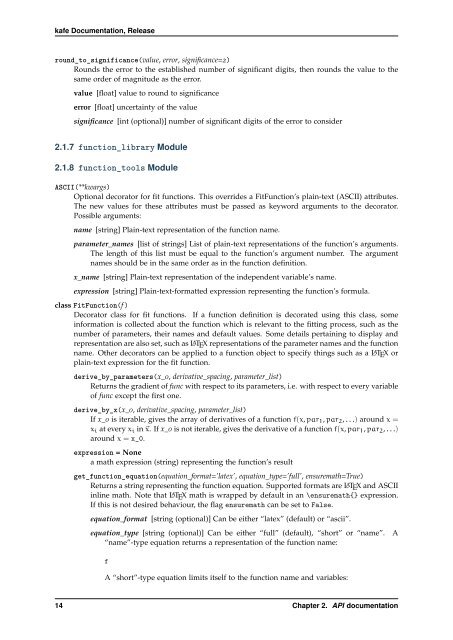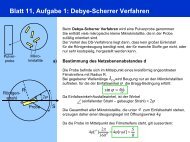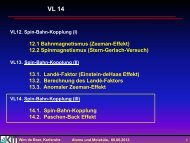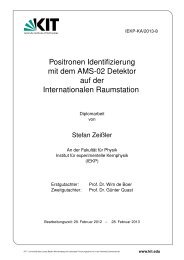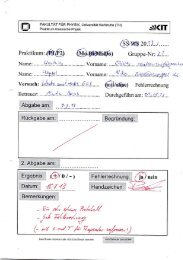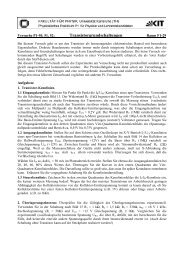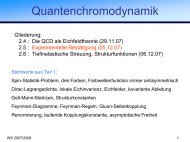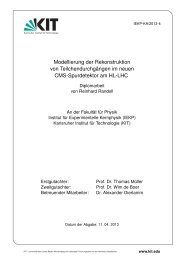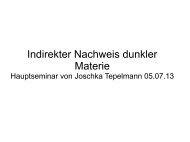kafe – Ein Python-Paket für elementare Datenanalyse im ...
kafe – Ein Python-Paket für elementare Datenanalyse im ...
kafe – Ein Python-Paket für elementare Datenanalyse im ...
Sie wollen auch ein ePaper? Erhöhen Sie die Reichweite Ihrer Titel.
YUMPU macht aus Druck-PDFs automatisch weboptimierte ePaper, die Google liebt.
<strong>kafe</strong> Documentation, Release<br />
round_to_significance(value, error, significance=2)<br />
Rounds the error to the established number of significant digits, then rounds the value to the<br />
same order of magnitude as the error.<br />
value [float] value to round to significance<br />
error [float] uncertainty of the value<br />
significance [int (optional)] number of significant digits of the error to consider<br />
2.1.7 function_library Module<br />
2.1.8 function_tools Module<br />
ASCII(**kwargs)<br />
Optional decorator for fit functions. This overrides a FitFunction’s plain-text (ASCII) attributes.<br />
The new values for these attributes must be passed as keyword arguments to the decorator.<br />
Possible arguments:<br />
name [string] Plain-text representation of the function name.<br />
parameter_names [list of strings] List of plain-text representations of the function’s arguments.<br />
The length of this list must be equal to the function’s argument number. The argument<br />
names should be in the same order as in the function definition.<br />
x_name [string] Plain-text representation of the independent variable’s name.<br />
expression [string] Plain-text-formatted expression representing the function’s formula.<br />
class FitFunction(f )<br />
Decorator class for fit functions. If a function definition is decorated using this class, some<br />
information is collected about the function which is relevant to the fitting process, such as the<br />
number of parameters, their names and default values. Some details pertaining to display and<br />
representation are also set, such as LATEX representations of the parameter names and the function<br />
name. Other decorators can be applied to a function object to specify things such as a LATEX or<br />
plain-text expression for the fit function.<br />
derive_by_parameters(x_0, derivative_spacing, parameter_list)<br />
Returns the gradient of func with respect to its parameters, i.e. with respect to every variable<br />
of func except the first one.<br />
derive_by_x(x_0, derivative_spacing, parameter_list)<br />
If x_0 is iterable, gives the array of derivatives of a function f(x, par 1 , par 2 , . . .) around x =<br />
x i at every x i in ⃗x. If x_0 is not iterable, gives the derivative of a function f(x, par 1 , par 2 , . . .)<br />
around x = x_0.<br />
expression = None<br />
a math expression (string) representing the function’s result<br />
get_function_equation(equation_format=’latex’, equation_type=’full’, ensuremath=True)<br />
Returns a string representing the function equation. Supported formats are LATEX and ASCII<br />
inline math. Note that LATEX math is wrapped by default in an \ensuremath{} expression.<br />
If this is not desired behaviour, the flag ensuremath can be set to False.<br />
equation_format [string (optional)] Can be either “latex” (default) or “ascii”.<br />
equation_type [string (optional)] Can be either “full” (default), “short” or “name”.<br />
“name”-type equation returns a representation of the function name:<br />
f<br />
A “short”-type equation l<strong>im</strong>its itself to the function name and variables:<br />
A<br />
14 Chapter 2. API documentation


